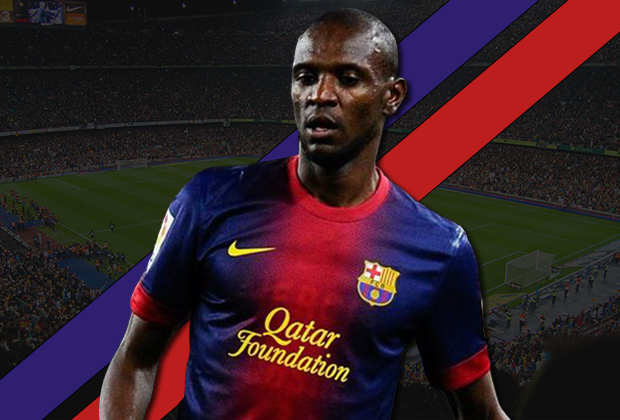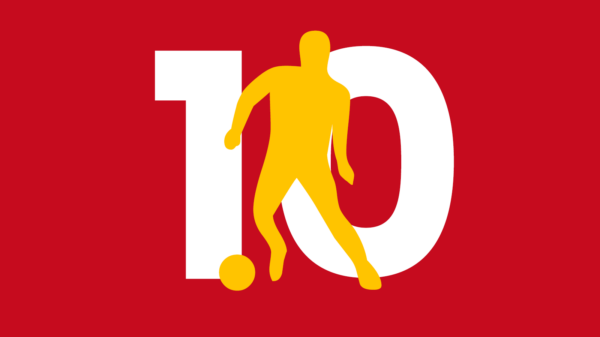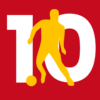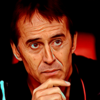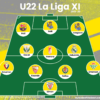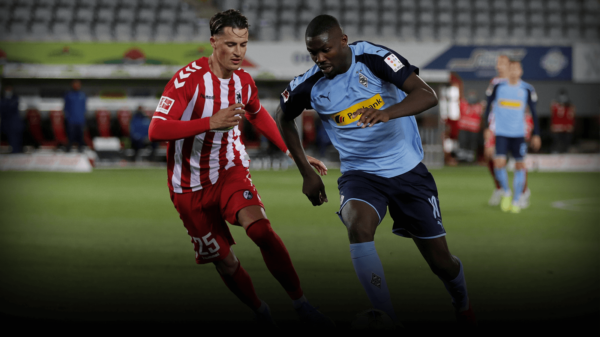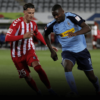The image of a ‘Sporting Superman’ is how we look at our footballing legends these days but surely Eric Abidal can be considered a different kind of that ‘Sporting Superman.’ Mark Ooi talks about how the recent retired Frenchman touched the lives of many football fans and others around the world in this tribute piece.
There are footballers retiring every year, from top professionals who will go down in history as some of the greatest we have seen – such as Thierry Henry, Paul Scholes and Alessandro Nesta in recent times – to the lower division journeymen who most football fans would never have heard of, with all due respect. There are a myriad of reasons for retirement, be it injury, to prepare for the apocalypse – hello, Carlos Roa – or after falling out of love with football like David Bentley. How we remember footballers would depend on the legacy that they leave behind, the lasting impression that they made on us. It is the memories that we as football fans hold onto most dearly; perhaps it was a last minute winner in a fiercely-contested derby, a coolly-taken penalty in a shootout or someone who played for only one club throughout his career. However, for all the memories, only a certain few can leave behind a legacy that touches us on a human level, away from the pitch. Eric Abidal is one such player.
Just for the titles that Abidal has amassed as an important part of the glorious Guardiola era at Barca, he could be legitimately considered a credible role model for any aspiring youngster making his or her way up the footballing ladder with dreams of such success. Abidal was a key part of that Barca defence under Pep, as he was the Yin to Dani Alves’ swashbuckling Yang and provided the balance which allowed the Brazilian to bomb forward with reckless aplomb as an auxiliary right winger. The consistency of performance that the Frenchman produced game after game after game was exemplary and well-worth aspiring to – even if you are just playing football in the park with friends. That said, it will be forever for non-footballing reasons that I, and my fellow culés, will fondly remember Eric Abidal by.
Eric Abidal left such an indelible mark due to the resilience, strength and spirit that he showed in beating his liver illness twice. In March 2012, a full year on from the first announcement of his liver tumour in 2011, Abidal was announced to be in need of a liver transplant in order to beat his illness. Bear in mind that, till that point in time, the Frenchman had made 38 senior appearances for Barça in the 2011/12 season after making his first full recovery from illness.
Abidal revealed in 2013 that Dani Alves had offered to be the liver donor that the Frenchman required as part of his medical treatment. Alves was willing to risk his own career, when he was at his footballing peak no less, in making this offer. Eric Abidal held such value not just to Alves but also to the whole squad and the club as a whole that, in 2011, Xavi referred to the moment Abidal told his teammates of his liver tumour as “simply the worst moment I’ve experienced in any dressing room”.
Messages from football fans and his fellow professionals worldwide flooded social media in support of Abidal in his fight against his illness. One of the most touching shows of support was the applause that sounded around Camp Nou throughout the 22nd minute of the first home match – vs Getafe – after Abidal’s operation.
As I write this piece, I can still vividly recall getting out of my seat and standing up in the living room of my home to join in the applause in that 22nd minute of that match against Getafe. Sure, my contribution was in no way heard at Camp Nou. Sure, someone stood up in front of the television screen and clapping away would have looked absolutely ridiculous to anyone who happened to be in the same room. It did not matter then, and it does not matter now. It was a gesture of support that I’m certain I was not the only one doing, be it at Camp Nou or in homes across the world. From the way Abidal conducted himself before and most certainly after contracting his illness, he deserved every bit of support that he received.
A revelation that emerged in the media during the process of his recovery was that Abidal had sold his collection of luxury sports cars.
“When something happens to you as happened to me, then these cars are useless. It’s better to sell them and give money to associations and hospitals, use it to help children.”
Eric Abidal on selling his sports cars
In October 2012, Eric Abidal was cleared to return to training. By then, Abidal had gotten his priorities in order and was focused on his health rather than whether he could continue playing football.
“Football has been everything. Now, the most important thing for me is to be healthy. The objective is not to get back to playing. We have to see how it goes. There are things I will endure and others I won’t. Family and health are my priorities. I had an operation two years ago so I already started to see life differently then. Today, I see it a little more differently every day. There are things that are priorities now that weren’t before.”
Eric Abidal in November 2012
To quote the late Pope John Paul II, “Amongst all unimportant subjects, football is by far the most important”.
Yes, football is grouped with the “unimportant subjects” and this is rightfully so.
With regard to the resilience and strength that Abidal showed, his recovery from his first battle with his liver illness was inspirational. The speed at which Abidal recovered was so rapid that he played the full 90 minutes of Barça’s 2011 Champions League win – 3-1 against Manchester United – at Wembley just two months after being diagnosed and operated on. For all the highlights of that final, it is what happened after the final whistle that had the biggest impact on the football world. Barça captain Carles Puyol handed Abidal the captain’s armband and ceded to him the opportunity to lift the trophy. There certainly were highlights for fans to take away from that final – Lionel Messi’s goal from outside the box, David Villa’s sublime curler into the top corner, Xavi’s assist for Pedro Rodriguez’s well-placed opener or Messi’s brilliant feint to burst past a hapless Nani down the right. However, it is the image of Eric Abidal lifting the Champions League trophy that will live on in history as the iconic image of that 2011 final.
As with the aforementioned applause at the Camp Nou against Getafe, I again shamelessly clapped away in my living room when Abidal came off the bench to make his return in April 2013 against Mallorca. Abidal had come on to replace Gerard Pique in the closing stages and the substitution was met with a standing ovation and resounding cheers of “Abi! Abi!” from the Camp Nou faithful. In May that same year, Puyol repeated what he had done the previous year at Wembley. Receiving the La Liga trophy from league officials, Puyol walked over to the centre circle, where his teammates were. Puyol then gestured to Abidal and then-head coach the late Tito Vilanova and left the trophy to them. He left the trophy for them to raise to the skies in celebration of the team’s triumphant league campaign. Again, that was how highly Abidal was, and undoubtedly still is, valued.
Much like the sad news of Junior Malanda’s death that I awoke to on the morning of this very day I sit here writing this piece, the announcement in March 2011 that Eric Abidal had a liver tumour caught me completely off-guard. I mean, there was simply no way that any of us would have envisaged such a thing happening, let alone to someone like Abidal. Strong, athletic, dominant and an absolute rock of a defender on the Camp Nou pitch – “Eric Abidal” and “liver tumour” in the same sentence… Really?
In this day and age where footballers are placed on a pedestal and given almost demi-god status, we are often completely ignorant to the fact that these footballers are all still human. It isn’t that we willingly choose to ignore that fact. Rather, the thought of the mortal fallibility of our footballing heroes just does not cross our minds. As human beings, these players are equally as susceptible to illness and death. On the subject of illness, mental illness to be specific, could the reason why a case like that of the late Robert Enke shocked us as much as it did be put down to the aforementioned point that we place footballers on a pedestal, seemingly immune to the mortality of us all?
It is precisely this indestructible image of footballers – the sporting superman, if you will – that we have constructed over time, particularly with the exponential rise of the celebrity culture, that ended up playing no small part in Enke’s tragic demise. Robert Enke chose not to open up when he could have gotten the help and support that he needed when he began to feel the pressure. Depression is not an easy topic, even for common people, though it is far easier for someone who isn’t of celebrity status to seek counselling or try Delta 8 THC Tinctures to help improve their mental health. If the press had found out he had sought out a simple therapy session it could have placed even more pressure on him and taken fan support away. The need for a footballer to hide any weaknesses meant that Enke hid his clinical depression even when the German national team psychologist checked on him. Nowadays mental health awareness is higher than before and more celebrities are opening up about their treatments. And there are more options than there were before such as medicinal cannabis (click here to learn more about cannabis) as well as cannabis oil which are known to reduce stress and anxiety. They are also said to treat stressful factors like pain and insomnia as well. Cannabis and its derivatives are often used in a growing number of medical products too. They are becoming much more widely accepted and recognised in the medical world, though progress for some seems slow. These products are not hard to access, especially private label cbd oil that athletes are said to be using today as a treatment for joint pain and stress. It’s just such a shame these options weren’t as prominent to Enke before he succumbed to the disease. There are also talking therapies available, which Enke unfortunately missed because he was not able to open up about how he felt. This is another very sad fact to learn, it almost seems as though there was everything there to prevent his death, but no one managed to step up and help in time.
Enke and Abidal have more in common than just the name “FC Barcelona” on their respective lists of the clubs they played for during their playing days. Both Enke and Abidal – and also without forgetting the plethora of other such cases – also prove that the image of the sporting superman is a false one and is ultimately to the detriment of these footballers and athletes that we idolize.
Rather than aspiring to, and (un)wittingly perpetuating the image of the sporting superman, we should instead look to learn from Eric Abidal. Consistency of performance(in whatever field you find yourself in), resilience and fighting spirit – these are all values that we should aspire to and strive to achieve in our lives.
Eric Abidal only ever scored 2 goals for Fútbol Club Barcelona. His first was in 2010/11 at San Mamés, when he scored an equaliser to tie a Copa del Rey Last-16 2nd Leg at 1-1 to send Barça through to the next round on the away goals rule. There are two Barça goals that, as a culé, I personally most celebrated over. One was Andrés Iniesta’s famous equaliser at Stamford Bridge in 2008/09 that sent the team through to what was a beautiful final that completed the treble season in Rome’s Stadio Olimpico. The other was Abidal’s second and last goal for Barça. It was in 2011/12 at the Santiago Bernabéu. Messi was on the ball in the centre of the pitch, 30 yards from Iker Casillas’ goal. Messi then opens up his body to curl an inch-perfect chipped through pass to Abidal, who had ghosted in from the left into the box unmarked. Abidal used his chest to cushion the ball to land ahead of him. A simple toepoke finish and he had scored. It was one of Barça’s four goals in a 4-3 aggregate victory to send Barça through to the Semi-Finals of the Copa del Rey. The Blaugrana ended up winning the Copa del Rey that season. However, most importantly, it was after Eric Abidal’s return from illness.
Força Abidal.
Written by Mark Ooi.
- Scout Report: Thomas Lemar | AS Monaco’s playmaking maestro - June 5, 2017
- The Academy Series | 10 best Sevilla products: Sergio Ramos, Marchena, and Jesus Navas feature - March 25, 2017
- Newcastle United: All aboard the Rafalution - August 8, 2016




















































